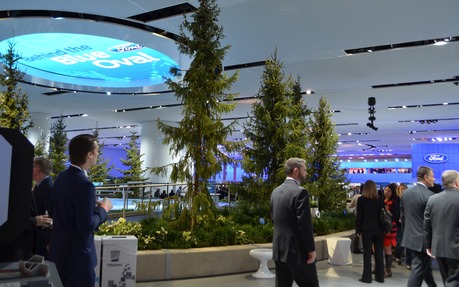The Future of Car Shows
It will not be news for anyone that we live in a world of change. The world has in fact been changing since the dawn of time, but over the last few decades, change has been driven by technology; technology changes very quickly, bringing major changes in our lives as individuals and as members of society.
Car shows are certainly not immune to change. Admittedly, their main purpose remains to boost sales of cars, as well as many other related items, and most of them are held at a time of year when sales are slowest. The Montreal International Auto Show and the Canadian International Auto Show in Toronto, you may have noticed, is held in January and February, respectively.
This was true a hundred years ago, and will likely be true a hundred years down the road. Recently, however, we have seen how show organizers worldwide make increasing use of social media to communicate with visitors. Showgoers can buy their admission tickets in advance, choose their favourite vehicles from a list, and so on.
Over the years, car shows have found different ways to attract attention. For example, a Green Car of the Year award is handed out at the Los Angeles show. The Detroit show features the North American Car and Truck of the Year awards; the New York show crowns the World Car of The Year award, and so on. The Montreal show is less prestigious, and gets to unveil only the finalists for the title of car and SUV of the year in Canada. It’s the Toronto show that has the honour, a month later, of announcing the Canadian Car and Utility Vehicle of the Year awards. The trend is likely to persist, for two reasons: show organizers are looking for ways to add significance to their events, and manufacturers are thrilled whenever one of their offerings wins an award.
You might have thought that with the rise of the Internet, car shows would lose their appeal, as people could check out new cars on line, instead of going to a show. This has not happened, at least for the time being. However, it does mean that journalists reporting on car shows now have to take the new reality into account. These days, new cars and features are often revealed well ahead of a show, and articles are written in advance for publication when the time comes. If a new model is kept under wraps before the show, as happened with the Ford GT first seen at the Detroit show in January 2015, you can see it on any of the social media within 30 seconds of the launch!
In the short term, car shows should not be undergoing dramatic change. However, the constantly rising costs faced by organizers and exhibitors alike could spell the end for some of these events. A number of manufacturers now pick and choose among the available shows. In January 2016, Volvo didn't attend the Montreal show. Rolls-Royce and Ferrari have long since abandoned the Detroit show, since the North American market does not generate enough revenue to justify the expenditure.
So it is not technology that threatens car shows: on the contrary, technology is in fact an ally. What may change the whole picture is the matter of cost.
